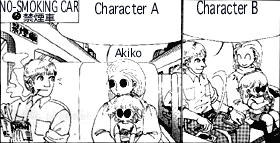|
|
|
Politeness and American Conversational Usage Functions: Requesting, Apologizing, Thanking |
|
|
|
Politeness and American Conversational Usage Functions: Requesting, Apologizing, Thanking |
Because I wanted to teach my Japanese students how to communicate politely, I developed American Conversational Usage Games that cover dozens of relevant communication functions. Here I will focus on three: requesting, apologizing, and thanking. These conversational usage games are easy to understand, simple to play, and practical - in essence a preparation for real-life communication.
While working on these games , I was a bit surprised to discover how much Americans differed over the proper level of politeness and appropriateness of what could be said. The differences could be attributed to such variables as locale, age, gender, and ethnic background. They did, however, arrive at a consensus.
It is helpful to focus on two cultures (in this case, Japan and the U.S.A.) to facilitate learning or teaching conversational usage, but we should not overlook the limitation of translating expressions, or the fact that an American or a Japanese might not say anything in a particular situation when the other would.
Finally, I hope that you enjoy the games ....
(How to Play American Conversational Usage Games
For an explanation, please click on Pragmatics
and Conversational Usage.)
|
|
|
Game |
||
| Conversational Focus Although this is a no-smoking car, the man next to Akiko is smoking a cigarette ... |
Communication Function CharacterA / CharacterB Asking someone to stop smoking / Agreeing (to stop) |
Character A / Character B 1. Please don't smoke here. / Oh, I'm sorry. |
 What would you say? |
||
|
|
|
|
|
|
|
|